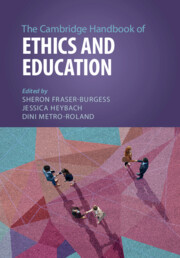Book contents
- The Cambridge Handbook of Ethics and Education
- The Cambridge Handbook of Ethics and Education
- Copyright page
- Epigraph
- Contents
- Figures
- Tables
- Contributors
- Foreword
- Preface
- Acknowledgments
- Part I Traditions in Ethics and Education
- 1 Ancient Chinese Ethics and Education
- 2 Ancient Greek and Roman Ethics and Education
- 3 Ubuntu Ethics and Education in Southern Africa
- 4 Ethical and Environmental Knowledge and Education
- 5 Ethics, Education, and the Inheritance of Abraham
- 6 Prioritizing Outcomes
- 7 Freedom and the Ethics of Educational Authority
- 8 Moral Education in the Virtues
- 9 The Ethics of Bildung and Liberal Education
- 10 American Pragmatism, Democratic Ethics, and Education
- 11 Radical Ethics
- 12 The Ethics of Phenomenology and Hermeneutics in Education
- 13 Feminist Ethics and the Contradictions of Gender
- 14 Postmodern/Poststructuralist Ethics and Education
- Part II Ethics and Education in Practice
- Part III Emerging Ethical Pathways and Frameworks
- Index
- References
1 - Ancient Chinese Ethics and Education
from Part I - Traditions in Ethics and Education
Published online by Cambridge University Press: 07 March 2024
- The Cambridge Handbook of Ethics and Education
- The Cambridge Handbook of Ethics and Education
- Copyright page
- Epigraph
- Contents
- Figures
- Tables
- Contributors
- Foreword
- Preface
- Acknowledgments
- Part I Traditions in Ethics and Education
- 1 Ancient Chinese Ethics and Education
- 2 Ancient Greek and Roman Ethics and Education
- 3 Ubuntu Ethics and Education in Southern Africa
- 4 Ethical and Environmental Knowledge and Education
- 5 Ethics, Education, and the Inheritance of Abraham
- 6 Prioritizing Outcomes
- 7 Freedom and the Ethics of Educational Authority
- 8 Moral Education in the Virtues
- 9 The Ethics of Bildung and Liberal Education
- 10 American Pragmatism, Democratic Ethics, and Education
- 11 Radical Ethics
- 12 The Ethics of Phenomenology and Hermeneutics in Education
- 13 Feminist Ethics and the Contradictions of Gender
- 14 Postmodern/Poststructuralist Ethics and Education
- Part II Ethics and Education in Practice
- Part III Emerging Ethical Pathways and Frameworks
- Index
- References
Summary
This chapter explores the concept of virtue (de) in Confucianism and Daoism, which are the two prominent indigenous traditions in ancient China. It is argued that virtue, from an ancient Chinese paradigm, is essentially about moral excellence and influence. In the Confucian traditions, virtue is manifested in the exaltation of moral goodness and ethical charisma of exemplary persons. In the Daoist traditions, virtue is encapsulated in the emptying of one’s heart-mind and in noncoercive action. Chinese ethics in the ancient past stress the utmost importance of (inter)personal cultivation of virtues and role-modeling. School leaders, teachers, students, and other educational stakeholders should develop themselves and others morally so as to collectively achieve dao (the Way), which is a shared vision of human excellence.
- Type
- Chapter
- Information
- The Cambridge Handbook of Ethics and Education , pp. 5 - 23Publisher: Cambridge University PressPrint publication year: 2024
References
- 1
- Cited by

